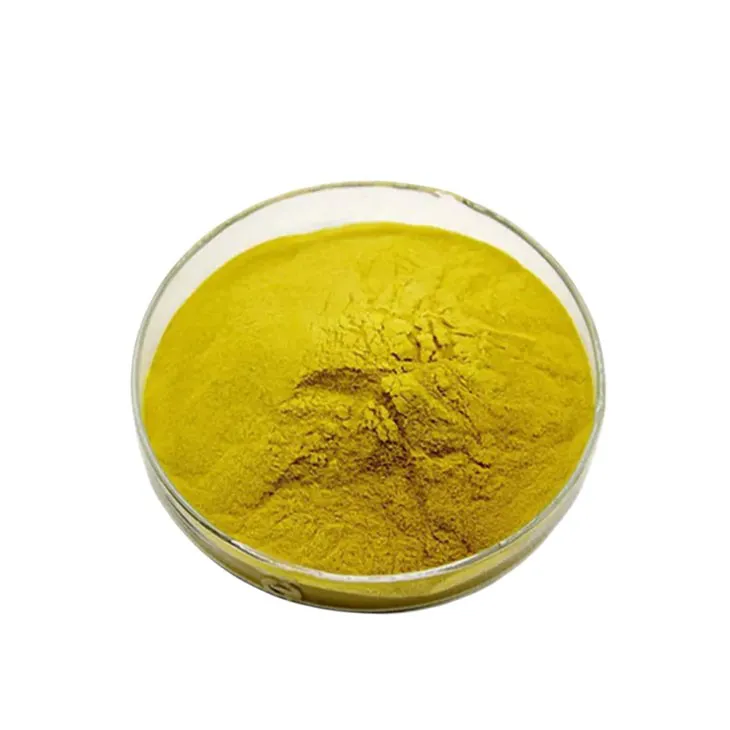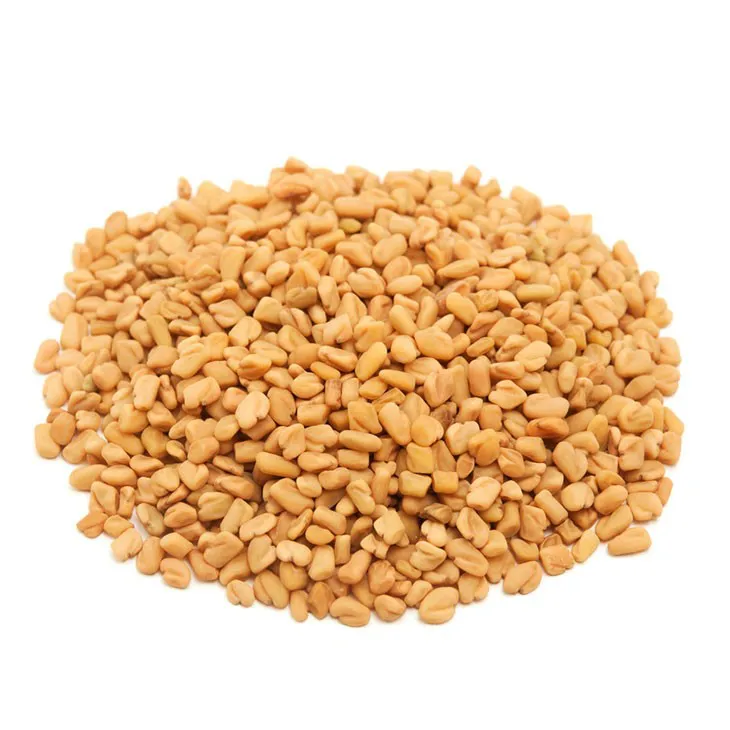- 0086-571-85302990
- sales@greenskybio.com
Fenugreek extract powder: Is the extract effective for weight loss?
2024-11-12

1. Introduction
In the quest for effective weight loss solutions, many natural substances have come under the spotlight. One such substance is Fenugreek Extract Powder. Fenugreek has a long history of use in traditional medicine systems across different cultures. However, when it comes to its effectiveness for weight loss, there is a need for a comprehensive analysis. This article delves into the scientific research, traditional uses, and potential side effects of Fenugreek Extract Powder to determine whether it can truly play a role in reducing weight.

2. What is Fenugreek Extract Powder?
Fenugreek (Trigonella foenum - graecum) is an annual plant in the family Fabaceae. Fenugreek extract powder is made from various parts of the fenugreek plant, typically the seeds. The seeds are rich in bioactive compounds such as saponins, flavonoids, and dietary fiber.
These bioactive components are believed to be responsible for the potential health benefits associated with fenugreek. Saponins, for example, may have an impact on the body's hormonal balance, while flavonoids are known for their antioxidant properties. The dietary fiber content can also influence digestion and satiety.

3. Traditional Uses of Fenugreek
3.1 In Ayurvedic Medicine
In Ayurvedic medicine, which is one of the world's oldest holistic healing systems, fenugreek has been used for centuries. It has been employed to treat a variety of ailments, including digestive disorders, diabetes, and inflammation. Ayurvedic practitioners also believe that fenugreek can help in maintaining a healthy body weight, although the mechanisms underlying this were not fully understood in the traditional context.
3.2 In Traditional Chinese Medicine
Similarly, in Traditional Chinese Medicine (TCM), fenugreek has been used as a medicinal herb. TCM often focuses on the balance of the body's energy, known as Qi. Fenugreek was thought to help regulate Qi and improve the function of the spleen and stomach, which are important organs related to digestion and metabolism. By enhancing digestion and metabolism, it was postulated that fenugreek could potentially contribute to weight management.

4. Scientific Research on Fenugreek and Weight Loss
4.1 Impact on Appetite
One of the key aspects in weight loss is appetite control. Some studies have suggested that fenugreek extract powder may have an effect on appetite. The high fiber content in fenugreek can increase the feeling of fullness, thereby reducing the amount of food consumed. For example, a study involving a group of participants showed that those who consumed fenugreek - rich products reported a decreased desire to eat between meals.
4.2 Effect on Metabolism
Metabolism also plays a crucial role in weight management. Fenugreek may influence the body's metabolic rate. Research has indicated that certain compounds in fenugreek, such as saponins, could potentially affect thyroid function. The thyroid gland is a major regulator of metabolism in the body. By interacting with thyroid - related mechanisms, fenugreek might increase the basal metabolic rate, leading to more calories being burned at rest.
4.3 Role in Blood Sugar Regulation
Another area of interest is fenugreek's role in blood sugar regulation. High blood sugar levels can lead to increased fat storage in the body. Fenugreek has been shown to help regulate blood sugar levels by improving insulin sensitivity. When insulin works more effectively, it can prevent excessive blood sugar spikes and subsequent fat deposition. For instance, in diabetic patients, fenugreek supplementation has been associated with better glycemic control, which could indirectly contribute to weight loss.

5. Potential Side Effects of Fenugreek Extract Powder
While fenugreek may offer potential benefits for weight loss, it is also important to consider its potential side effects.
- Digestive Issues: Some people may experience digestive discomfort such as bloating, gas, and diarrhea when consuming fenugreek extract powder. This is likely due to the high fiber content, which can be difficult for some individuals' digestive systems to handle.
- Allergic Reactions: Although relatively rare, allergic reactions to fenugreek can occur. Symptoms may include skin rashes, itching, and in severe cases, difficulty breathing.
- Hormonal Effects: Fenugreek has the potential to affect hormonal levels. In some cases, it may interact with hormonal medications or cause hormonal imbalances in certain individuals. For example, fenugreek may mimic the effects of estrogen in the body, which could be a concern for those with hormonal - sensitive conditions.
6. How to Incorporate Fenugreek Extract Powder into a Weight Loss Plan
If one decides to use fenugreek extract powder as part of a weight loss plan, it is important to do so in a safe and effective manner.
- Dosage: It is crucial to determine the appropriate dosage. The optimal dosage may vary depending on factors such as age, gender, and overall health. Consulting a healthcare provider or a nutritionist is recommended to ensure the correct dosage.
- Combination with a Balanced Diet: Fenugreek extract powder should be incorporated into a balanced diet. It should not be seen as a substitute for healthy eating habits. A diet rich in fruits, vegetables, lean proteins, and whole grains should still be the foundation of a weight loss plan.
- Exercise: Physical activity is an essential component of weight loss. Fenugreek extract powder should be used in conjunction with regular exercise, such as aerobic exercises and strength training, to achieve the best results.
7. Conclusion
In conclusion, fenugreek extract powder shows some potential in aiding weight loss through its effects on appetite, metabolism, and blood sugar regulation. However, more research is needed to fully understand its mechanisms and long - term effectiveness. Additionally, the potential side effects of fenugreek extract powder cannot be ignored. When considering using fenugreek for weight loss, it is advisable to consult a healthcare professional to ensure its safe and appropriate use within the context of an individual's overall health and weight loss goals.
FAQ:
What is fenugreek extract powder?
Fenugreek extract powder is derived from the fenugreek plant. It contains various bioactive compounds such as saponins, flavonoids, and alkaloids. These components are thought to have different physiological effects on the body.
How does fenugreek extract powder potentially aid in weight loss?
Some studies suggest that fenugreek extract powder may affect weight loss in a few ways. It might help regulate blood sugar levels, which can in turn reduce cravings for sugary and high - calorie foods. Additionally, it could potentially increase metabolism or reduce the absorption of dietary fats in the gut, although more research is needed to confirm these mechanisms.
Are there any scientific studies supporting fenugreek extract powder for weight loss?
There have been some scientific studies exploring the relationship between fenugreek extract powder and weight loss. For example, certain research has shown that fenugreek can have an impact on blood glucose control, which is related to body weight regulation. However, the evidence is not yet conclusive, and more large - scale, well - designed studies are required.
What are the traditional uses of fenugreek that might be related to weight management?
In traditional medicine, fenugreek has been used for various purposes. It has been used to improve digestion, and good digestion can potentially play a role in weight management. Some traditional uses also suggest that it may help with metabolism, which could be relevant to weight loss, although these traditional uses are not always based on scientific evidence.
What are the possible side effects of using fenugreek extract powder for weight loss?
Some possible side effects of fenugreek extract powder include gastrointestinal issues like diarrhea, flatulence, and abdominal discomfort. In some cases, it may also cause allergic reactions. Pregnant women should be cautious when using fenugreek as it may have hormonal effects that could potentially affect the fetus.
Related literature
- The Effects of Fenugreek on Metabolic Syndrome: A Review"
- "Fenugreek Extract and Its Impact on Blood Glucose and Body Weight"
- "Traditional Uses of Fenugreek and Their Potential Links to Modern Health"
- ▶ Hesperidin
- ▶ Citrus Bioflavonoids
- ▶ Plant Extract
- ▶ lycopene
- ▶ Diosmin
- ▶ Grape seed extract
- ▶ Sea buckthorn Juice Powder
- ▶ Fruit Juice Powder
- ▶ Hops Extract
- ▶ Artichoke Extract
- ▶ Mushroom extract
- ▶ Astaxanthin
- ▶ Green Tea Extract
- ▶ Curcumin
- ▶ Horse Chestnut Extract
- ▶ Other Product
- ▶ Boswellia Serrata Extract
- ▶ Resveratrol
- ▶ Marigold Extract
- ▶ Grape Leaf Extract
- ▶ New Product
- ▶ Aminolevulinic acid
- ▶ Cranberry Extract
- ▶ Red Yeast Rice
- ▶ Red Wine Extract
-
Shikone Extract
2024-11-12
-
Sophora Japonica Flower Extract
2024-11-12
-
Ivy Extract
2024-11-12
-
Dandelion Root Extract
2024-11-12
-
Citrus bioflavonoids
2024-11-12
-
Fig Extract
2024-11-12
-
Hops Extract
2024-11-12
-
Black Pepper Extract
2024-11-12
-
Hericium erinaceus extract powder
2024-11-12
-
Aminolevulinic acid
2024-11-12





















